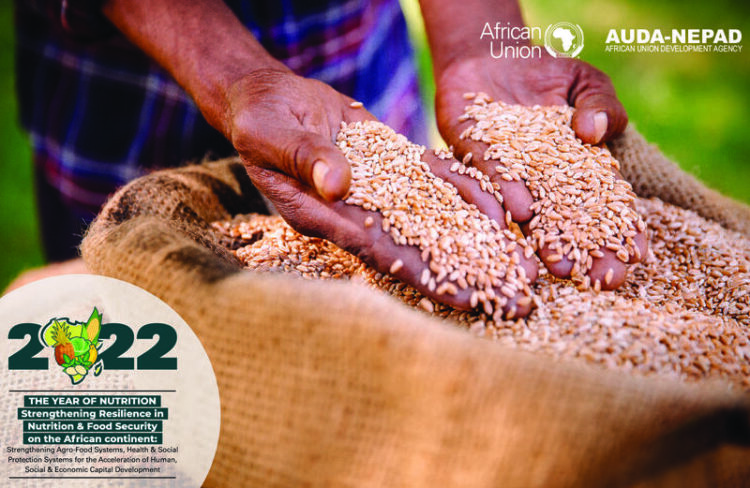Africa’s Common Position on Food Systems
In 2021, the African Union Commission (AUC) and African Union Development Agency-NEPAD (AUDA-NEPAD) worked with African countries to create a common African position ahead of the Food Systems Summit in line with the African Union’s Agenda 2063 and the United Nation’s Sustainable Development Goals (SDGs).
The African Common Position is a synthesis and unified view on how to transform Africa’s food systems over the next decade, primarily on resilience in the face of growing vulnerability and shocks. It is anchored in the Comprehensive Africa Agriculture Development Programme (CAADP) and Malabo Declaration on Accelerated Agricultural Growth.
Rapid expansion in agricultural and food productivity and production has been identified as one of the game-changing solutions. To prevent future disruptions in the supply chain for wheat and sunflower across Africa, countries that produce these cereals need to increase their capacity to produce and supply to other countries through intra-African trade.
And those that do not should consider incorporating specific food crops into their agriculture value chain. This will reduce the reliance on wheat and grain imports from Russia and Ukraine and, most importantly, promote intra-African trade and grow Africa’s agribusiness sectors.
African Continental Free Trade Area a lever and driver for intra-regional agri-food markets
Another lever in transforming Africa’s food systems is the African Continental Free Trade Area (AfCFTA) which came into effect on 1 January 2021. African countries must take advantage of the world’s largest free trade area.
The trade treaty is expected to offer US$2.5 trillion in combined GDP and agribusiness will significantly contribute to this growth. The AfCFTA will increase production and value addition as well as ensure adequate quality infrastructure and food safety standards to supply and grow local and regional agri-food markets.
The oil and gas factor
To avoid future food price shocks caused by rising oil and gas prices on the global market, African countries must improve their oil and gas production and exploration capability to fill any gaps that may occur as a result of supply chain disruption among the major global producers.
African countries that produce fuel and gas such as Algeria, Angola, Cameroon, Republic of Congo, Egypt, Equatorial Guinea, Libya, Mozambique, Nigeria, Senegal, Sudan, and Tanzania should explore boosting production and filling the gas and oil gap within the continent and beyond to alleviate fuel price shocks, which could contribute to lower food costs.
In addition, African governments should invest in or attract greater international investment in oil and gas exploration, particularly in countries where subterranean oil reserves are believed to exist but have yet to be explored.
2022 African Union Year of Nutrition
The AU declared 2022 the Year of Nutrition with the main objective to strengthen resilience in food and nutrition security. The AU CAADP biennial review report of 2019 revealed that Africa is not on track to meet its goal of ending hunger by 2025, noting a deterioration in food and nutrition security on the continent since the inaugural report in 2017.
Increasing food production and expanding Africa’s food basket will serve both nutrition and resilience objectives. In this regard, there must be intentional investments toward increased productivity and production of traditional and indigenous crops. This also requires a systems approach by integrating nutrition into resilient and strong health systems and social protection systems.
Climate resilience in Africa’s food systems
African food systems continue to face several challenges, including extreme weather events and climate change; limited adoption of yield-increasing technologies; dependency on rain-fed agriculture and low levels of irrigation; and most recently, the spread of fall armyworm in parts of the continent.
More than 38 million more people are at risk of hunger and poverty in Africa due to climate change. Climate-resilient technologies present major opportunities for the Continent to increase African food production and productivity while building resilience and reducing poverty and hunger.
Digital and biotechnologies and the transformation of food systems
While the Continent has made significant progress in the adoption and use of information and communication technologies for large-scale food producers, the benefits of digital innovations have not been fully leapfrogged by small-scale producers, processors, and retailers to access extension services, markets, and financial services.
Increasing the competitiveness of African agriculture also includes the adoption of biotechnology, including improved seed varieties, and requires robust food production policy frameworks. Biotechnology is expected to accelerate growth, create wealth, and feed an African population expected to reach 2.2 billion people by 2050.
Regional solutions are a prerequisite to addressing structural weaknesses and vulnerabilities, including poverty and inequality
The Russia-Ukraine conflict has once more exposed the urgent need for policy and investment choices to sustain and build viable, resilient, and inclusive food systems on the Continent.
The African Common Position on Food Systems provides pathways for Africa to increase home-grown agri-food production and ensure inclusive access to sustainable and nutritious food sources, while addressing structural weaknesses and vulnerabilities, including poverty and inequality.
The successful transformation of African food systems will largely depend on the willingness of African countries to realise continental and regional solutions to build and sustain greater resilience in the face of external shocks. 2022 is Africa’s Year to action food and nutrition development goals.
Ms. Josefa Sacko is the AUC Commissioner for Agriculture, Rural Development, Blue Economy and Sustainable Environment (ARBE), while Dr Ibrahim Mayaki is the Chief Executive Officer of AUDA-NEPAD
Source link : https://www.un.org/africarenewal/magazine/may-2022/how-russia-ukraine-conflict%C2%A0impacts-africa
Author :
Publish date : 2022-05-01 07:00:00
Copyright for syndicated content belongs to the linked Source.
